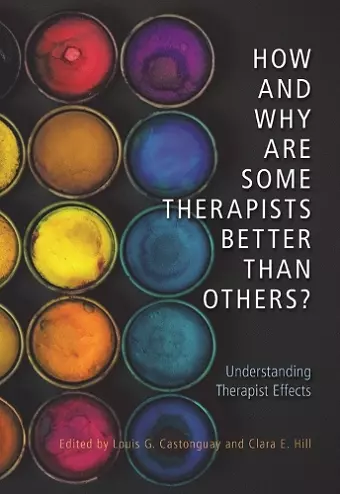How and Why Are Some Therapists Better Than Others?
Understanding Therapist Effects
Clara E Hill editor Louis G Castonguay editor
Format:Hardback
Publisher:American Psychological Association
Published:15th May '17
Should be back in stock very soon

Some therapists are more effective than others, that much is clear why they are more effective is less clear. This book identifies which characteristics make therapists more or less effective in their work and proposes guidelines to improve their effectiveness.
Editors Louis Castonguay and Clara Hill have gathered a panel of expert researchers and practitioners from diverse theoretical backgrounds to answer this complicated question. Synthesizing the rich literature on therapist effects in this comprehensive volume, they explore how various effects can help or hinder clients in therapy. They then propose practical strategies that mental health practitioners can use to improve their own effectiveness.
Castonguay, Hill, and their contributors first lay the empirical foundations for understanding therapist effects and why they are important. They also acknowledge the massive variability that exists among therapists and the complexities of studying therapist effects. Drawing from this fundamental knowledge, they then carefully examine specific therapist characteristics, attitudes, and skills that are relevant in any therapeutic setting. Topics include therapists amp rsquo responsiveness, presence, attachment, and technical interventions cultural factors negative emotions humor and creativity. Exciting new studies about therapist effects in the treatment of specific disorders, including depression and generalized anxiety, are also presented. The closing chapters translate the book amp rsquo s general themes and takeaways into broader applications for research, intervention, training, and policy, including the role of routine outcome monitoring.
amp ldquo This book does a good job of exploring what factors impact therapist effects. amp rdquo -Doody amp rsquo s Review Service
amp ldquo Ambitious in its scope, this book brings an innovative perspective to the improvement of psychotherapy practice. Chapter references and an index help to make the volume an invaluable resource for program directors, policy makers, and researchers, as well as practitioners themselves. amp rdquo -Choices
Ambitious in its scope, this book brings an innovative perspective to the improvement of psychotherapy practice. Chapter references and an index help to make the volume an invaluable resource for program directors, policy makers, and researchers, as well as practitioners themselves.
(Choice)Provides current researchers excellent reviews and critiques of existing research on various aspects of therapist effects.
(PsycCRITIQUES)This book does a good job of exploring what factors impact therapist effects.
(Doody's Review Service)Mix a bunch of expert research practitioners together to discuss what makes a therapist effective and you get this wonderful book filled with wisdom and research on what characteristics make some therapists better than others. Many of these characteristics can be acquired, and this is unquestionably the best current training guide for therapists.
- Leslie S. Greenberg, PhD, Distinguished Research Professor Emeritus, Department of Psychology, York University, Toronto, Ontario, CanadaParaphrasing Lake Wobegon's Garrison Keillor, we would like to think that all therapists are way above average. But in fact, some therapists are better than others, and that has implications for how we practice, how we train and supervise, and how we shape health care policy. Refreshingly, this book focuses on therapists rather than treatments. It is a must-read for all of us wanting to do the best by our clients.
- Hanna Levenson, PhD, Wright Institute, Berkeley, CAProgram directors, policymakers, psychotherapists, and psychotherapy researchers will all find this book useful. The authors review important findings on therapist effectiveness and the factors involved in differences. One chapter considers the policy implications of the troubling finding that there is a group of 5% to 2 % of therapists who are consistently at the bottom of the heap in effectiveness.
- Dianne L. Chambless, PhD, Professor of Psychology and Director of Clinical Training, University of Pennsylvania, PhiladelphiaISBN: 9781433827716
Dimensions: unknown
Weight: unknown
356 pages